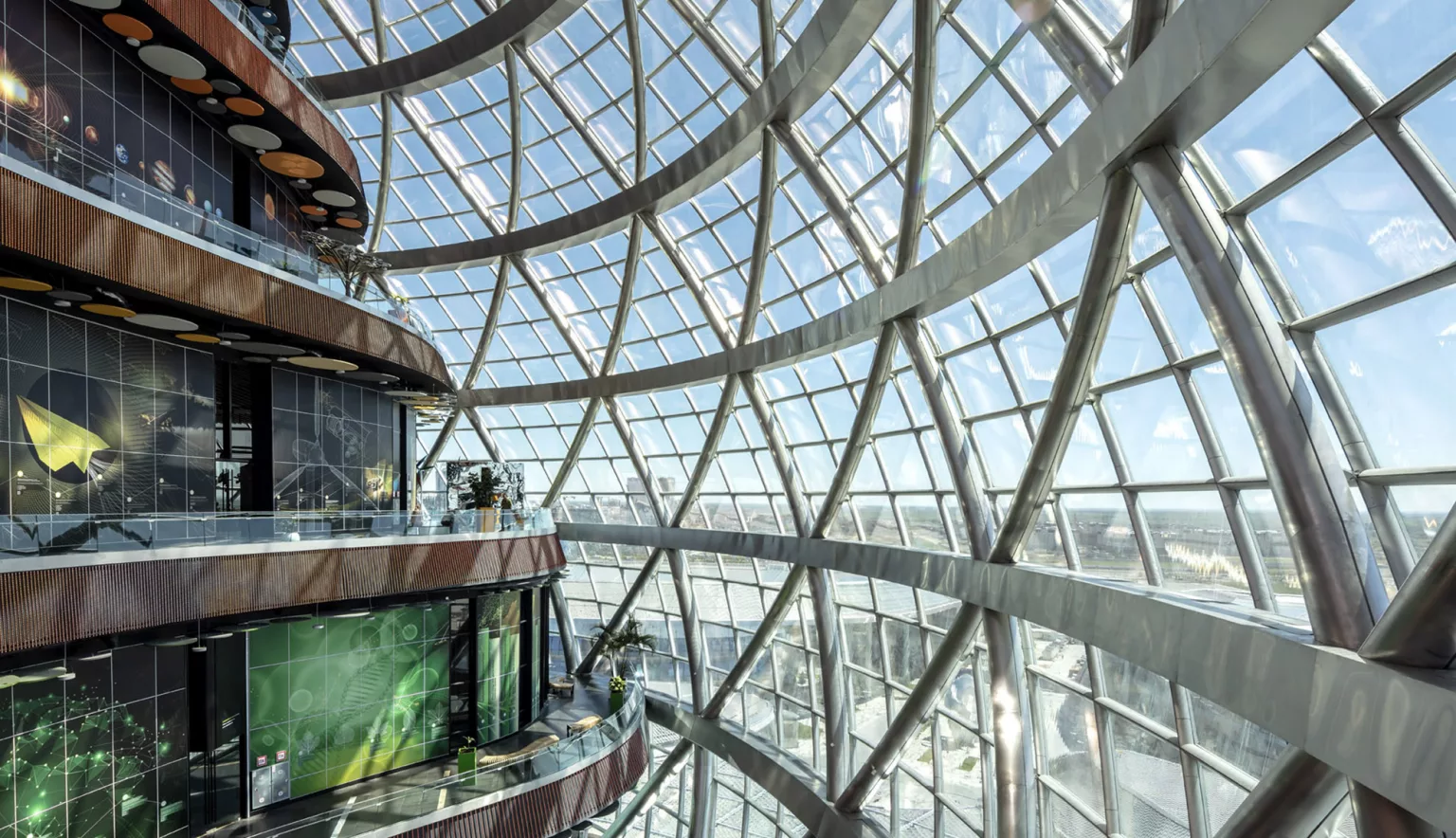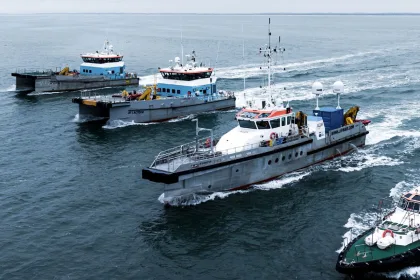A melting pot of speed, flexibility and innovation comprises recipe for success at Metal Yapi, the firm striving to position itself as the best façade company in the world.
EXTRAORDINARY EXTERIORS
“Can you picture 12th century architecture? The interiors of buildings often received no natural light owed to the absence of any attainable technology resembling glass. Early stage stainless glass had been invented, but only churches were able to afford this expensive material.
“The Tudor era saw glass become more common, but even then, houses were rented without it and tenants had to bring in their own temporary windows.
“The most important industry bounce came in the 20th century with the impact of major innovations in steel, aluminium, glass and also in supplementary sectors such as air-conditioning and elevators which made high rise buildings feasible.
“Digitalisation and developments in the software market that came at the turn of the millennium then gave architects and façade engineers the freedom to design and produce the most complex geometries while rationalising cost and time.
“Just think how much easier and quicker Gaudi could have realised his projects in Barcelona should he have had today’s software.”
For Bulent Ozgul, the historic time- line of architectural transitions is a subject of fascination.
Buildings have been transformed from century to century as new technologies, materials and techniques have added to the arsenal of construction practitioners throughout the ages.
Yet in the eyes of Ozgul, an individual well placed to comment on the current state of construction as the President and CEO of world leading Turkish façade specialist Metal Yapi, the best is yet to come.
“There has been a lot of improvement and innovation in façades,” he muses, “but we’re anticipating that the real ground-breaking developments will show up in the coming 10 or 20 years.”
GAINING AN ADVANTAGE
Indeed, this excitement will unquestionably become increasingly accompanied by challenges.
The traditional pressures of the sector, be it harsh working environments, safety risks, time pressures, cost pressures and rising competition or otherwise, already make the construction industry one of the most demanding in the world, second only to mining in the eyes of Ozgul.
Yet the impending influx of innovations that the CEO refers to equally dictate that agility, adaptability and flexibility are becoming increasingly crucial to the success of sector players, critical to the diversification of skillsets and delivery of cutting-edge developments.
So how can agility be achieved?
For Metal Yapi, the answer is threefold, beginning with its standing as a vertically integrated engineering group comprising specialisms spanning custom design engineering, testing, fabrication, installation and full lifecycle maintenance, ensuring it operates in a cradle to grave manner.
Second is its adept management information system named DNS (Digital Nervous System) – a technology which successfully leverages globally recognised financial analysing and tracking software to enable the company to establish a more dynamic and responsive management system.
And third, deemed by Ozgul to be Metal Yapi’s key differentiator, is its design and development architectural fenestration and façade systems which meet the innovative and complicated geometries linked with demanding, technical architectural requirements.
He explains: “We take each project as a unique case – a challenge to innovate, improve and create a specific customised façade system design while taking into consideration the feasibility and easiness during all phases of the operation process.
“In today’s façade industry worldwide, the design process lacks cohesion as far as the implementation and application processes are concerned. System houses comprising designers and material traders are on one end and on the other there are façade and fenestration contractors who buy the system materials from the system houses.
“Almost all façade contractors work this way because making new system designs every time while meeting prestigious project demands requires highly technical knowhow, experienced staff and extensive research and product development, as well as the need of façade laboratories.
“Often, the result is a disconnected process where the feedbacks from the application field are not linked organically with the designer. Yet by bridging the gaps and looking at the projects as a cycle that infinitely feeds each segment of its entirety, rather than a straight-line process, we gain an advantage.”
PROVEN BY PROJECTS
This turnkey approach has seen the enterprise garner great respect in the global market, the firm to date having completed more than 1,300 projects in 91 cities across 38 countries.
Norman Foster, Calatrava, Maximiliana, SOM and Adrian Smith are just some of the world’s heavyweight architects that it has worked with, Metal Yapi’s portfolio providing the best evidence of its esteemed reputation.
“We’re proud of all our projects,” Ozgul affirms. “Saint Gobain’s headquarters, VINCI’s Siège Social, the Le Monde building and a number of airports spring to mind as particularly prestigious highlights, but I could name many others.
“In principle, we do not make any advertisements and we do not attend to exhibitions. For us, the best marketing relies on the successful completion of a project. When you finish a job successfully you do not only gain a returning customer, but also gain the confidence of an architect, a consultant, a contractor company, and managers that will be referred from other companies at the end of the job, thus potentially creating new networks.
“A job is also observed intimately by the neighbouring sites, which in return may become interested if your quality and speed are deemed to be satisfactory. In brief it is the performance that counts.”
These attitudes are typical of the company. Its quality over quantity ethos is a major reason behind the its consolidated expansion over the years, successfully establishing itself in new markets as opposed to taking on sporadic one-shot projects.
“Our centralised goal is to become one of the top three façade companies in any country after entering into that region within five years, and to be the best in 10 years,” Ozgul adds.
Indeed, achieving this ambition universally in a diverse array of international markets is not without its challenges. Yet the firm’s 1,300-strong talented workforce combine a mixture of proven experience and youthful creativity to deliver projects consistently and effectively, giving it the best chance of success in each and every new location.
These contributions do not go unnoticed, and in return the business provides a family-like culture and a number of programmes in the aim of both rewarding and retaining its staff.
“We take care of our personnel, make all the best efforts for a good working environment. We’re the only company that I’ve come across that serves free breakfast and free lunch in a well decorated cafeteria, for example,” Ozgul states.
“We also recruit new graduates every year and train them in our in-house façade academy. We are a teaching organisation, collectively learning and educating each other all the time.”
NOT THE BIGGEST BUT THE BEST
Considering the stature of these esteemed staff, the organisation’s emphasis on innovation, and the consistent quality showcased by its proven projects, Metal Yapi stands in good stead to meet its ambitions moving forward.
Two decades ago, the organisation laid out its aim of becoming one of Europe’s top five façade companies by ensuring it excelled in eight categories: engineering, research and development, mechanisation, testing facilities, international trade, office automation and digitalisation, robotics and productivity.
When this was achieved in 2005, a new goal was set to become the best façade company in the world by 2023.
“The slogan was ‘not the biggest but the best – big enough to be known, small enough to be well managed’,” Ozgul explains. “Our sector is the most difficult among all subcontractors in the construction industry, and we have observed that the biggest ones have even bigger management problems, so the optimal size had to be discovered for sustainability.”
It is this same vision that continues to drive the company today, the firm set to launch a marketing campaign comprising a 100-question survey in 2023 consisting of 25 questions for each stakeholder – namely the person-nel, suppliers, clients and the share-holders – that will allow it to evaluate in a mathematical method whether or not it has met this mission thus far.
And regardless of its outcome, Ozgul reiterates that the firm’s strides for perfection will never waver.
He concludes: “Looking at ourselves, we have a long way to go in terms of transcending into digital management systems in order to control the three critical factors – cost, quality and time – and will strive to better equipped in these areas moving forward.
“We’re also committing ourselves to obtain zero waste in all terms of resources, introducing digitalised and automated quality tracing mechanics to establish a more responsive and therefore dynamic management to
be the fastest in the sector.
“We will, however, be measured in our approach. In the past 36 years, I have personally witnessed four slump times and four booms. There is a cycle in all aspects of life and all systems in the world alike.
“My point is you must not dream when the economy is booming and should not give way to depression when it is in crisis. My strategy to prepare for the future always has been to think of the bad days, take measures, do not waste any resources and always be optimistic.”






























